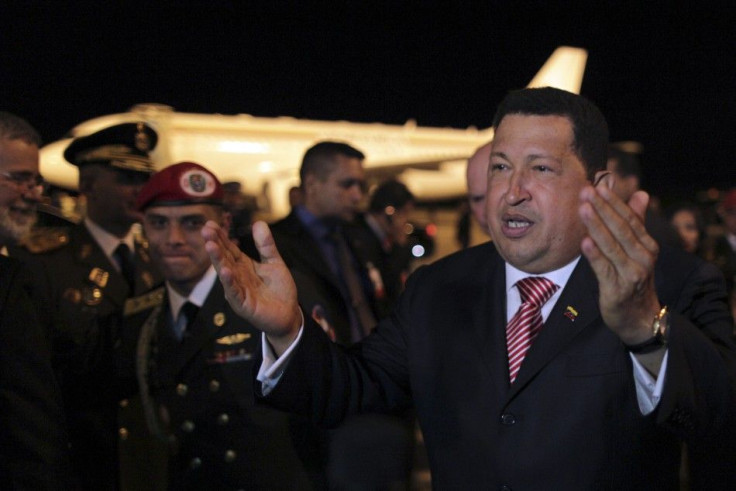Oil, Gas, And The Quest For New Friends: Chavez Hails Venezuela's Entry Into Mercosur

Venezuelan President Hugo Chavez is attending the South American trading bloc Mercosur's summit in Brazil, where his country has been inducted as an official member of the group after a six-year wait.
Chavez, who is in the middle of a presidential campaign, has long sought membership into Mercosur, which would reduce most trade tariffs between member states Brazil, Argentina, Uruguay and Paraguay.
"Mercosur increases its territory, its population, its economic potential," Chavez said of his country's new membership upon his arrival in Brazil.
Venezuela's bid to join Mercosur was previously blocked by right-wing members of the Paraguayan congress who were opposed to Chavez's leftist ideology and economic policies.
Paraguay's membership was suspended in June following the removal of Paraguayan President Fernando Lugo from office in an express impeachment trial that was criticized by Mercosur member states for its lack of due process.
Chavez also strongly criticized the move by the Paraguayan congress as he considered Lugo a close ally and part of the contingent of leftist Latin American leaders, who are among the few friends Venezuela's authoritarian president as on the world stage.
Nevertheless, it has temporarily cost Paraguay its Mercosur membership, opening up the door for Venezuela to join.
The original member states will gain greater access to Venezuela's vast oil and natural gas reserves, while Chavez has said his country's membership will allow it to diversify its oil-driven economy and expand its imports to a wider market.
However, there is particular concern among Venezuelan farmers that the agreement will allow Brazil and Argentina to flood the market with cheap agricultural products with which they will be unable to compete.
"Now we just survive, and when Mercosur arrives I don't know what will happen," said Vincent Perez, a Venezuelan coffee grower, in an interview with the Associated Press, adding that he and other farmers are already struggling due to high inflation and strict price controls.
Regardless, Chavez is keen on developing stronger economic and political ties with neighboring South American countries in an effort to compete with other major economic blocs, such as the U.S.-Mexico-Canada trinity of the North American Free Trade Agreement, or NAFTA, and the European Union.
Mercosur, however, has experienced a series of internal trading disputes, particularly between its two economic heavyweights Brazil and Argentina, leading to increased tariffs on numerous products and countering the original free-trade intent of the union.
"Argentina is seen as hostile to foreign capital ... Brazil continues to draw investment," Jose Botafogo Goncalves, a former Brazilian diplomat and representative to the bloc, told Reuters.
Chavez, facing reelection in October, avoided focusing on the divisions within the group, instead touting the benefits of Venezuela's entry.
Before boarding his flight to Brazil, Chavez said his country's oil wealth would form an integral part of the bloc that already has "the leading producer of food on the planet, the largest reserve of biodiversity in the world, the largest fresh water reserves in the world. It is the perfect equation; it lacked Venezuela."
© Copyright IBTimes 2024. All rights reserved.











